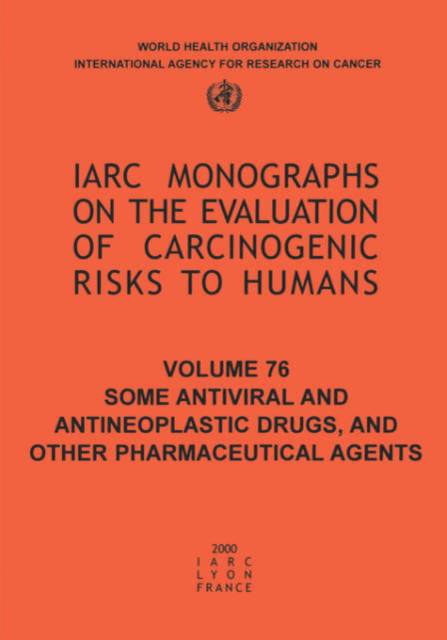
- Retrait gratuit dans votre magasin Club
- 7.000.000 titres dans notre catalogue
- Payer en toute sécurité
- Toujours un magasin près de chez vous
- Retrait gratuit dans votre magasin Club
- 7.000.0000 titres dans notre catalogue
- Payer en toute sécurité
- Toujours un magasin près de chez vous
Some Antiviral and Antineoplastic Drugs and Other Pharmaceutical Agents
Iarc Monograph on the Carcinogenic Risks to Humans
The International Agency for Research on Cancer
73,95 €
+ 147 points
Description
Evaluates the carcinogenic risks to humans posed by the use of four antiretroviral agents four DNA topoisomerase II inhibitors used in the treatment of cancer and an additional three pharmaceutical agents (hydroxyures phenolphthalein and vitamin K substances). The volume marks the first IARC evaluation of nucleoside analogs that act as antiviral agents.
The evaluation responds in part to recent findings that zidovudine (AZT) an effective antiretroviral agent now being given to pregnant HIV-infected women to prevent maternal-to-fetal transmission of the virus is a transplacental carcinogen in mice. The opening monograph evaluates the carcinogenicity to humans of the antiretroviral nucleoside analogs zidovudine (AZT) zalcitabine (ddC) and didanosine (ddI) and the antiherpesvirus drug aciclovir. Of these aciclovir and didanosine could not be classified on the basis of available data. For zidovudine transplacental administration to mice resulted in an increased incidence and multiplicity of lung and liver tumours and in an increased incidence of female reproductive tract tumours in one study but not in another involving treatment at a lower dose.
Despite observation of toxic effects in some studies of humans human carcinogenicity data were judged to provide inadequate evidence of carcinogenicity in humans. Zidovudine was classified as possibly carcinogenic to humans. Similar weaknesses in human carcinogenicity data for zalcitabine which consistently induces thymic lymphomas in mice resulted in its classification as possibly carcinogenic to humans.
The second monograph evaluates four DNA topoisomerase II inhibitors: etoposide teniposide mitoxantrone and amsacrine. Of these etoposide - one of the most widely used and effective cytotoxic drugs in combination therapy - was classified as probably carcinogenic to humans and etoposide in combination with cisplatin and bleomycin was judged to be carcinogenic to humans. Teniposide was classified as probably carcinogenic to humans and mitoxantrone and amsacrine were classified as possibly carcinogenic to humans.
Of the three pharmaceutical agents evaluated in the final monograph hydroxyurea which is widely used in cancer treatment and increasingly in combination with didanosine in HIV infection could not be classified. Phenolphthalein a widely used laxative now being withdrawn from the market in many countries because of toxicological concerns was classified as possibly carcinogenic. Vitamin K substances could not be classified on the basis of available evidence.
The evaluation responds in part to recent findings that zidovudine (AZT) an effective antiretroviral agent now being given to pregnant HIV-infected women to prevent maternal-to-fetal transmission of the virus is a transplacental carcinogen in mice. The opening monograph evaluates the carcinogenicity to humans of the antiretroviral nucleoside analogs zidovudine (AZT) zalcitabine (ddC) and didanosine (ddI) and the antiherpesvirus drug aciclovir. Of these aciclovir and didanosine could not be classified on the basis of available data. For zidovudine transplacental administration to mice resulted in an increased incidence and multiplicity of lung and liver tumours and in an increased incidence of female reproductive tract tumours in one study but not in another involving treatment at a lower dose.
Despite observation of toxic effects in some studies of humans human carcinogenicity data were judged to provide inadequate evidence of carcinogenicity in humans. Zidovudine was classified as possibly carcinogenic to humans. Similar weaknesses in human carcinogenicity data for zalcitabine which consistently induces thymic lymphomas in mice resulted in its classification as possibly carcinogenic to humans.
The second monograph evaluates four DNA topoisomerase II inhibitors: etoposide teniposide mitoxantrone and amsacrine. Of these etoposide - one of the most widely used and effective cytotoxic drugs in combination therapy - was classified as probably carcinogenic to humans and etoposide in combination with cisplatin and bleomycin was judged to be carcinogenic to humans. Teniposide was classified as probably carcinogenic to humans and mitoxantrone and amsacrine were classified as possibly carcinogenic to humans.
Of the three pharmaceutical agents evaluated in the final monograph hydroxyurea which is widely used in cancer treatment and increasingly in combination with didanosine in HIV infection could not be classified. Phenolphthalein a widely used laxative now being withdrawn from the market in many countries because of toxicological concerns was classified as possibly carcinogenic. Vitamin K substances could not be classified on the basis of available evidence.
Spécifications
Parties prenantes
- Auteur(s) :
- Editeur:
Contenu
- Nombre de pages :
- 521
- Langue:
- Anglais
- Collection :
- Tome:
- n° 76
Caractéristiques
- EAN:
- 9789283212768
- Date de parution :
- 01-06-00
- Format:
- Livre broché
- Format numérique:
- Trade paperback (VS)
- Dimensions :
- 178 mm x 254 mm
- Poids :
- 911 g

Les avis
Nous publions uniquement les avis qui respectent les conditions requises. Consultez nos conditions pour les avis.






